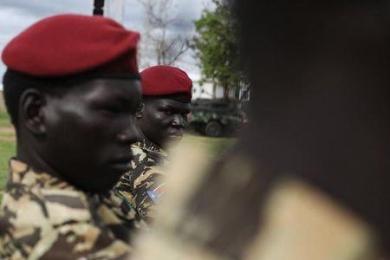South Sudan pulls out presidential guards force division from Juba
February 25, 2016 (JUBA) – South Sudanese government has announced on Thursday a decision to pull out excess presidential guards force division from its headquarters located south of the presidential palace in the national capital, Juba.

The prospect to implement the security arrangements in the capital per the peace deal the parties signed in August last year has raised hopes it could lead to formation of a transitional unity government and attract foreign aid to fund the new government and help rescue the collapsing economy of the country.
It will be the first time Machar-allied troops will be deployed in Juba since December 2013, when a row between him and president Kiir quickly descended into a civil war that turned into ethnic battle. Machar narrowly escape from Juba leaving behind dozens of his personal bodyguards in his Juba residential house. His bodyguards were massacred in his compound and his house demolished by President Kiir’s bodyguards.
The new announcement to withdraw some of the thousands of President Kiir’s bodyguards from Juba, came as the United Nations secretary general, Ban Ki Moon, paid a working visit to the country where he held a more than one hour closed door meeting with president Kiir and some members of his cabinet, resulting in Kiir agreeing in principle to commit himself and his administration to respecting permanent ceasefire and to fully implement peace agreement which he signed on 26 August 2015.
Both Machar and Kiir signed the deal under intense pressure from regional and global community, specifically the United States, the United Nations and other western powers.
They agreed to share ministerial positions in January but have been unable to form a transitional government of national unity due to slow movement with implementation of key provisions, including withdrawal of troops from Juba to at least 25km of town and to deploy a joint security forces to take charge of the general security situation in town and its surroundings before Machar could return.
But the deal has repeatedly failed to make significant progress and a United Nations report last month said both leaders qualified for sanctions over atrocities in the conflict.
In a meeting late on Tuesday, signatories of the deal agreed that 1,370 troops from the armed opposition will be deployed in Juba starting 1 March. But it remains unclear how the troops scattered in different parts of the country would quickly be assembled and dispatched to Juba with less than five days remaining to beat the deadline provided by the joint Monitoring and Evaluation Commission (JMEC).
Speaking to reporters on Thursday, the commander of presidential guards force division, Major General Marial Chanuong Yol, said government troops were withdrawing in compliance with directives from president Salva Kiir and the chief of general staff of the Sudan People’s Liberation Army (SPLA), Paul Malong Awan.
It may take two more weeks for the process of implementing the security arrangements in Juba to complete.
Also reports from some quarters within the South Sudanese army say the withdrawn troops have been facing lack of shelter and food and some of them trek back to the capital in the evening hours in search of food.
(ST)
